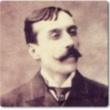The Tale of the Unknown Island
(Libby/OverDrive eBook, Kindle)
Available Platforms
Description
More Details
Similar Titles From NoveList
Similar Authors From NoveList
Published Reviews
Booklist Review
In 1998 Nobel laureate Saramago's parable, a man persists in knocking on the door of a king. After three days, the king himself opens the door and asks the man what he wants. He wants a boat so that he may search for the unknown island. After questioning the wisdom of such a mission, the king agrees to give the man a boat. When the man heads for the harbor with royal permit in hand, the king's cleaning lady follows him, determined to exchange her present duties for swabbing the decks of the ship of exploration. After the boat is secured from the harbormaster, the woman more intrudes than introduces herself and sets about making things shipshape while the man, who has no sailing experience, goes into town to recruit a crew. He returns alone and unsuccessful, though with food for himself and the woman. They bed down on opposite sides of the boat, and the man dreams of being on the voyage of discovery. The man and woman wake in one another's arms, and they set out at midday on the boat, which they have named The Unknown Island. It is possible to be irked by the ploy of publishing a short story at the price of a trade paperback, but when the story proves as ingratiating as Saramago's, one's annoyance is considerably lessened. --Ray Olson
Publisher's Weekly Review
Winner of the 1998 Nobel Prize in Literature, Saramago (History of the Siege of Lisbon) departs from his signature dense, inventive linguistic style and historically encompassing subjects to offer a simple, intriguing fable. This short, illustrated book begins as a fairy tale with a decidedly political inflection: an unnamed man waits by the king's door for petitions, a door the king neglects because he's occupied at the door for favors ("favors being offered to the king, you understand"). The man's tenacity happily coincides with the monarch's fear of a popular revolt, which results in the king begrudgingly granting the man a seaworthy boat with which he can sail to find "the unknown island." A philosophical discussion about whether such an island exists or is findable precedes the king's acquiescence, and the reader understands that the man is a dreamer, with bold imagination and will. The king's cleaning woman also intuits this, and she leaves the palace to join the man in his adventure. The two would-be explorers claim the boat, only to realize they have no provisions or crew. They elude despair with a celebratory meal and a burgeoning romance. Whether the vessel, newly christened The Unknown Island, ever finds its destination remains a mystery, but a crucial and tender suggestion persists: follow your dream and your dream will follow. More cynical readers may interpret the moral as "be careful what you wish for; you might get it." At the book's close, the man tosses in a dream marked with a desperate yearning for the cleaning woman and filled with images of lush flora and fauna thriving in the boat. Saramago tells his deceptively plain tale in simple prose studded with the dialogue of endearingly innocent characters; readers, dreamers and lovers will detect the psychological, romantic and social subtexts. (Nov.) FYI: Harcourt will simultaneously issue the paperback edition of Blindness. (c) Copyright PWxyz, LLC. All rights reserved
Library Journal Review
A Nobel prize winner's fable about a man who petitions an indolent king for a boat. (c) Copyright 2010. Library Journals LLC, a wholly owned subsidiary of Media Source, Inc. No redistribution permitted.
Kirkus Book Review
This richly enigmatic short story, published last year by Portugal's reigning Nobel laureate (Blindness, 1998, etc.), is a mischievous and thoughtful satire on ruling elites and bold dreamers, cast in the form of revisionist fairy-tale. One day an unidentified man knocks at the door of a royal castle and demands that its king (of a likewise unspecified country) give him a boat: ``To go in search of the unknown island.'' The king at first protests that nothing unknown exists any longer (according to his royal geographers); but then, worn down by persistent petitioners'and in spite of himself piqued by the stranger's boldness'relents. The cleaning woman, who has overheard all, joins forces with the man (though a crew cannot be assembled), and their hopes of sailing away to this imprecise Xanadu or Shangri-la are resolved only by the man's complex concluding dream, in which this transparent parable of aspiration (``If you don't step outside yourself, you'll never discover who you are'') opens into a vision (of their ship as 'a forest that sails and bobs upon the waves'') that assumes the dimensions of creation myth. This delightfully cryptic fiction incorporates vivid imagery, aphoristic concision, superbly wry dialogue, and subtly layered levels of meaning: it's variously ``about'' complacent bureaucracies resistant to change, visionaries who are both courageous enough to reach beyond and unable to see the mud below for the stars above, and'just possibly'Christopher Columbus's successful petition for the reluctant Spanish monarchy's support of his great adventure (in this respect, it is perhaps most closely related to Saramago's witty allegory The Stone Raft, 1995). The Swedes knew what they were doing when they honored Saramago. He may be the world's greatest living novelist.
Booklist Reviews
In 1998 Nobel laureate Saramago's parable, a man persists in knocking on the door of a king. After three days, the king himself opens the door and asks the man what he wants. He wants a boat so that he may search for the unknown island. After questioning the wisdom of such a mission, the king agrees to give the man a boat. When the man heads for the harbor with royal permit in hand, the king's cleaning lady follows him, determined to exchange her present duties for swabbing the decks of the ship of exploration. After the boat is secured from the harbormaster, the woman more intrudes than introduces herself and sets about making things shipshape while the man, who has no sailing experience, goes into town to recruit a crew. He returns alone and unsuccessful, though with food for himself and the woman. They bed down on opposite sides of the boat, and the man dreams of being on the voyage of discovery. The man and woman wake in one another's arms, and they set out at midday on the boat, which they have named The Unknown Island. It is possible to be irked by the ploy of publishing a short story at the price of a trade paperback, but when the story proves as ingratiating as Saramago's, one's annoyance is considerably lessened. ((Reviewed November 15, 1999)) Copyright 2000 Booklist Reviews
Library Journal Reviews
A Nobel prize winner's fable about a man who petitions an indolent king for a boat. Copyright 1999 Cahners Business Information.
Publishers Weekly Reviews
Winner of the 1998 Nobel Prize in Literature, Saramago (History of the Siege of Lisbon) departs from his signature dense, inventive linguistic style and historically encompassing subjects to offer a simple, intriguing fable. This short, illustrated book begins as a fairy tale with a decidedly political inflection: an unnamed man waits by the king's door for petitions, a door the king neglects because he's occupied at the door for favors ("favors being offered to the king, you understand"). The man's tenacity happily coincides with the monarch's fear of a popular revolt, which results in the king begrudgingly granting the man a seaworthy boat with which he can sail to find "the unknown island." A philosophical discussion about whether such an island exists or is findable precedes the king's acquiescence, and the reader understands that the man is a dreamer, with bold imagination and will. The king's cleaning woman also intuits this, and she leaves the palace to join the man in his adventure. The two would-be explorers claim the boat, only to realize they have no provisions or crew. They elude despair with a celebratory meal and a burgeoning romance. Whether the vessel, newly christened The Unknown Island, ever finds its destination remains a mystery, but a crucial and tender suggestion persists: follow your dream and your dream will follow. More cynical readers may interpret the moral as "be careful what you wish for; you might get it." At the book's close, the man tosses in a dream marked with a desperate yearning for the cleaning woman and filled with images of lush flora and fauna thriving in the boat. Saramago tells his deceptively plain tale in simple prose studded with the dialogue of endearingly innocent characters; readers, dreamers and lovers will detect the psychological, romantic and social subtexts. (Nov.) FYI: Harcourt will simultaneously issue the paperback edition of Blindness. Copyright 1999 Cahners Business Information.
Reviews from GoodReads
Citations
Saramago, J. (2000). The Tale of the Unknown Island . Houghton Mifflin Harcourt.
Chicago / Turabian - Author Date Citation, 17th Edition (style guide)Saramago, José. 2000. The Tale of the Unknown Island. Houghton Mifflin Harcourt.
Chicago / Turabian - Humanities (Notes and Bibliography) Citation, 17th Edition (style guide)Saramago, José. The Tale of the Unknown Island Houghton Mifflin Harcourt, 2000.
Harvard Citation (style guide)Saramago, J. (2000). The tale of the unknown island. Houghton Mifflin Harcourt.
MLA Citation, 9th Edition (style guide)Saramago, José. The Tale of the Unknown Island Houghton Mifflin Harcourt, 2000.
Copy Details
| Collection | Owned | Available | Number of Holds |
|---|---|---|---|
| Libby | 1 | 1 | 0 |

































